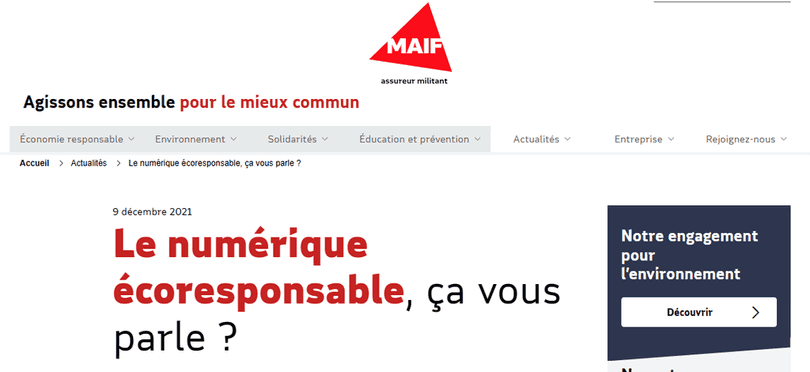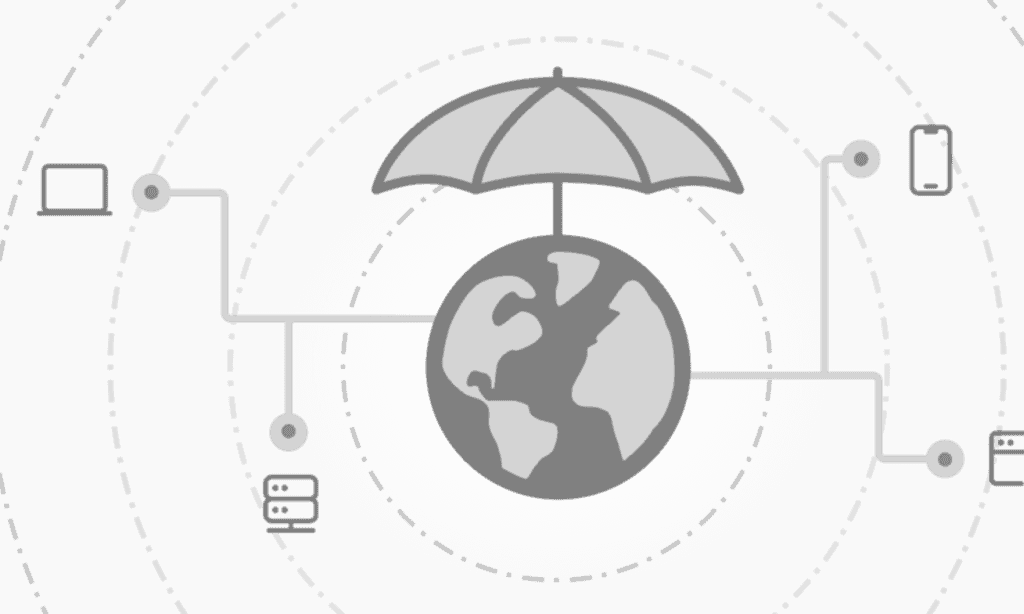Digital Sustainability and CSR: insurance increasingly concerned and committed to the issue
Players in the insurance sector today face new challenges: stricter European and national regulations on reporting extra-financial data, and growing expectations from stakeholders regarding the ethical and eco-responsible management of their activities. In addition to the risk of damage to their reputation, insurers are seeing their business model undermined by the emergence of new risks linked to global warming and the growing mobilization of our societies around environmental issues.
Although the need to respond to these new issues may be perceived as a constraint, many insurance companies have, on the contrary, seen the performance opportunity represented by a sustainable transformation of their business model. Indeed, there is no sector where the alignment between CSR and business benefits is more crucial, as insurance profitability is directly linked to societal and environmental conditions.
With the digital sector accounting for 1/3 of the carborn footprint of financial players, the insurance industry is increasingly seizing on this significant source of emissions by adopting a sustainable strategy of digital decarbonization. Let's take a closer look at the French insurance players who think and do digital differently, and the challenges they face in implementing a digital transition plan.

MAIF, an example of a responsible digital insurance company
MAIF's primary distinctive feature lies in its status as a company with a mission. Since 2009, a mission committee has ensured that the company achieves its social and environmental objectives. It was against this backdrop that MAIF turned its attention to digital responsibility in 2019. That year, MAIF formalized its membership of INR, demonstrating its commitment to digital responsibility. Two years later, it consolidated this objective by affixing its signature to INR's Digital Sustainability Charter, where it pledged to follow the principles of sobriety and inclusion, notably in the design of its digital services as well as in its IT purchasing policy.
But what really makes MAIF unique is the fact that it has gone beyond the stage of a company following a digital transition plan to become an insurance company that is an actor in Responsible Digital. Using its role as a trusted third party for the French public, the insurance company raises awareness of the environmental impact of digital technology and encourages best practices. It is also active in the social and societal aspects of the digital footprint, with the signing of its charter "pour un numérique humain et éthique" ("for a humane and ethical digital environment"): MAIF is active on the subject of the digital divide, and has also created the Numérique éthique platform to guide young people in their digital uses.
Allianz France: support for digital inclusion and commitment to a reduced footprint for its sites
Another player taking its CSR strategy head-on by tackling its digital footprint is general insurer Allianz France. Although it only signed INR's Responsible Digital Charter in May 2022, the insurance company had already been committed to digital responsibility and Green IT for several years. Notably by providing financial support to Simplon.co, an inclusive school dedicated to training in digital professions, by carrying out an audit of all its IT assets and by committing to reducing the carbon impact of its digital services. For this last reason, Allianz France had distinguished itself by becoming the winner of the APIdays Sustainable Challenge in 2021.
BPCE, a Responsible Digital sector dedicated to its digital decarbonization objective
France's second-largest banking group and a major player in the insurance sector, BPCE has included Responsible Digital in its ecological transition plan. Indeed, its objective for 2024 is to reduce its environmental footprint by 15% in 4 areas: Sustainable Real Estate, Responsible Purchasing, Sustainable Mobility and Responsible Digital! This last axis has given life to a Responsible Digital sector, organized around the IT Department, the Purchasing Department and the CSR Department.
Five workstreams have emerged from this initiative: Equipment Lifecycle, Responsible Digital Design (with the production of an application Eco-score), Responsible Digital Outreach, Data centers and Indicators.
fruggr's teams have worked with Groupe BPCE to help them implement these projects, in particular by optimizing their existing digital services and improving the accessibility of their platforms. They also helped to raise awareness among their teams on the subject of digital sobriety.
The challenges for insurance companies of reliable and responsible digita
As we mentioned earlier, the responsible digital transition of companies is a response to the challenges they face today. As these companies have understood, digital is an entry point through which they can consider their CSR strategy in its entirety, and in a concrete way. The Pacte Act has enabled all sectors, especially finance, to ask themselves the question of their raison d'être. The legal entity that is the company is putting key social issues back at the heart of its business model. Several insurance companies have taken on the status of mission-driven company to endorse this approach, a mission controlled by a committee made up of external stakeholders.
Transparency and extra-financial reporting
For some years now, insurance companies have been required by European legislation to report on their environmental, social and governance performance. The CSRD and CSDD directives, which complement each other, require companies to report precise data on their activities. On an international scale, SASB standards also provide a framework for extra-financial data on sustainable development. More specific to finance, the SFDR regulation aims to promote the ecological transition of players in the sector. Responsible Digital is a lever for initiating or furthering this transition, with the creation of detailed, automatically-generated data.
Anticipating financial risks
According to studies carried out by financial regulators, climate change is leading to the emergence of three categories of risk for the insurance business: physical risks, transition risks and legal and reputational risks. Each of these risks has repercussions on both insurers' liabilities (i.e. underwriting results) and assets (i.e. investments). However, these growing social and environmental challenges - especially those linked to the impact of digital technology - should not be seen as sources of risk. On the contrary, they pave the way for the creation of new opportunities to generate global value in profitability, sustainability and growth.
Alliance between digitalization and responsible digital transition
For insurance companies, the challenge of digitalization is crucial, given their growing dependence on data centers for information storage. Data centers currently consume 10% of France's electricity and account for 16% of the country's carbon footprint in the digital sector, according to the latest ADEME-Arcep study. However, the digitization of insurers is a process in which it is possible to integrate principles of sobriety and frugality.
The dematerialization of processes and the emergence of new online financial services offer major insurance companies an ideal opportunity to integrate eco-design and sobriety principles. By adopting an eco-responsible approach to their digital services, they can anticipate and limit environmental impact right from the design stage, with a view to reducing their ecological footprint.
Financial data protection
Ensuring the protection of their customers' financial data is a top priority for insurance companies. This involves complex processes of compliance with data protection regulations, as well as the implementation of robust and transparent security protocols. Adopting a Responsible Digital approach makes it possible to meet this objective by assessing the vulnerability and confidentiality of online digital services, optimizing information systems and designing digital services that are both sober and robust.

An opportunity for insurance: to be an example of sustainability
Taking CSR into account is no longer just a symbolic act of good conduct. These days, it is of vital importance as a key element in ensuring the economic sustainability and long-term performance of insurance companies. The insurance industry has always been an innovator when it comes to responsible business models, and mutual insurance companies are a perfect illustration of this. The growing commitment of the insurance industry and, in a broader perspective, of financial players to the subject of Responsible Digital Business, is the logical continuation of this global trend towards a sustainable ESG strategy.
"This is just the beginning, with players turning the commitment stage into concrete action, in a measured, monitored, objectified footprint improvement trajectory. Digital technology is a key element for a data-driven player like the insurance industry, and will set an example for other sectors in the future." Fréderic Marchand, CEO of digital4better x fruggr
